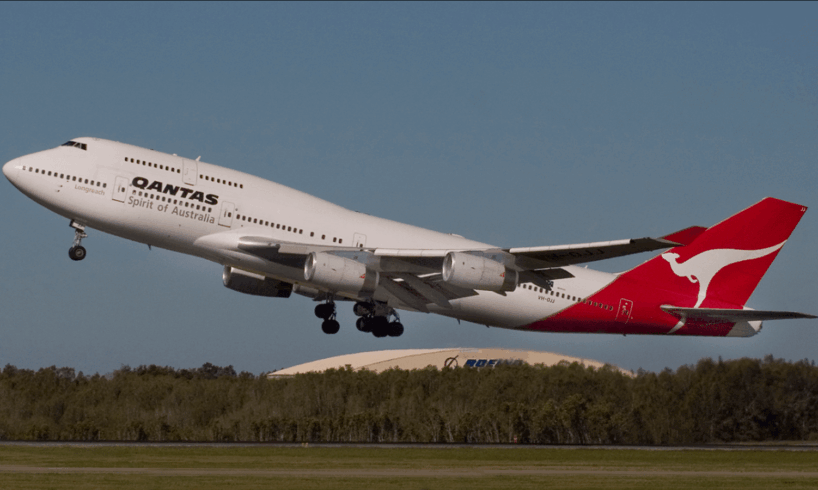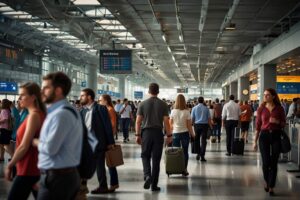
Last week, Federal Court Justice Michael Lee ordered Qantas to pay a fine of $90 million over its illegal sacking in 2020 of 1,820 baggage handling workers. At least $50 million of this will be paid directly to the Transport Workers Union (TWU), which unsurprisingly hailed the decision as a massive victory.
Qantas 747 [Photo by Sheba_Also / CC BY 4.0]
The fine is on top of $120 million the airline was previously ordered to pay in compensation to the workers—around $66,000 each on average, less than the median annual wage nationally—who were unceremoniously thrown on the scrap heap at the height of COVID-19 lockdowns and who have waited five years for the seemingly interminable legal manoeuvres to conclude.
What happens to the remaining $40 million of the fine is unclear. Last week, TWU national secretary Michael Kaine said the union would be “strongly submitting” that it go to “those 1,820 workers whose lives have been absolutely decimated.”
Yesterday, however, the union’s lawyers told the Federal Court “our position is $30 million would be an adequate sum [for the workers], and that the rest would be used for the general purposes.” In other words, the TWU bureaucracy wants to claw back an average of $5,500 each from its “absolutely decimated” members, in order to up its payout to $60 million.
The $90 million fine is reportedly the largest ever handed down against a company for breaching Australian industrial relations legislation. But this says more about the pro-business character of the laws and the courts that enforce them than the size of the fine, which is a drop in the ocean for Qantas. The company recorded an after-tax profit of $1.6 billion for the 2024–25 financial year, 27.9 percent higher than in 2023–24, off $23.8 billion in revenue.
While Justice Lee did not order the maximum possible penalty of $121 million, he stated that the fine should be large enough to not be viewed by Qantas as a “cost of doing business.” The response of the financial markets—a 1.6 percent jump in the airline’s share price in the hours after the ruling—suggests it is being viewed in exactly that light.
In handing down the fine, Lee referred to documents suggesting Qantas has saved some $80 million a year by outsourcing baggage handling, on top of $125 million annually from other aspects of a massive restructuring operation undertaken by the airline.
Noting that “neither the Commonwealth nor any executive government agency” took action against Qantas over the illegal sackings, Lee made clear that his ruling was intended to encourage the unions to serve as de facto regulators.
Lee declared: “It will send a message to Qantas and other well-resourced employers that not only… will they face potentially significant penalties for the breach of the act, but those penalties will be provided to trade unions to resource those unions in their role as enforcers of the act.”
The TWU bureaucracy, notwithstanding its complaint that $50 million is not quite enough, certainly agrees with this role, as do other leading union officials.
A spokesman for the Australian Council of Trade Unions (ACTU) said the “decision makes clear that when companies break the law, working people must have the means to hold them to account.” The “means” he is referring to is not any industrial or political struggle by workers. Instead, it is the capacity of the union apparatus to bankroll protracted legal machinations that serve to enrich the bureaucracy and prevent such a struggle.
The reality is that the $50 million payout to the TWU is a reward for services rendered not as a regulator of industrial laws, but of the working class. The bureaucracy earned its bounty by ensuring that the substantial anger of workers, at Qantas and more broadly, over the illegal sackings did not result in strikes or other industrial action, but was safely diverted behind the court case.
The TWU leadership was not only protecting Qantas, but the federal Liberal-National government, which, with the full support of Labor and the ACTU, handed the airline billions of dollars in so-called “Jobkeeper” payments even as it sacked or stood down vast swathes of its workforce.
Qantas used the onset of the COVID-19 pandemic as a pretext to deepen its existing restructuring operation, slashing at least 8,000 jobs and expanding its use of subsidiary companies as a means to employ new hires under lower wages and conditions than existing workers. In addition, the airline has imposed successive real wage cutting enterprise agreements across virtually its entire workforce.
None of this would have been possible without the collaboration of the TWU and other aviation unions, which have kept industrial action to a non-disruptive minimum throughout the past five years, despite votes to strike by almost every section of workers.
The integration of the unions into the framework of the pro-business courts and their hostility to any industrial action even when masses of workers are sacked are expressions of the role of the bureaucracy as an unalloyed police force of the corporations and governments.
The draconian Fair Work industrial legislation introduced by the union-backed Labor government in 2008, and its various amendments, including by the current federal Labor government, have expanded the power of, and further entrenched the union apparatus in, the industrial courts. The purpose is to deepen the suppression of strikes and the class struggle as a whole.
The balance sheet for the five years since the illegal sackings is revealing. Qantas is up by hundreds of millions of dollars, as the fine and compensation are dwarfed by the savings from the outsourcing and other cost-cutting measures undertaken with the confidence that the TWU and other unions would block any organised opposition by workers.
The TWU has pocketed at least $40 million after legal costs. The law firms representing both sides have collected tens of millions. The losers are the workers: the sacked baggage handlers, whose compensation after five years in the wilderness amounts to less than a year’s wage, and all the other Qantas workers who have been outsourced or slapped with real wage cuts enforced by the TWU and other aviation unions.
Conclusions must be drawn from this experience. Workers, in aviation or any other industry, cannot leave the defence of their jobs, wages and conditions in the hands of the courts, Labor or the unions. New organisations, rank-and-file committees democratically run by workers, not bureaucrats, must be built in every airport and workplace. Through these committees, workers can ensure that any attempt by management to slash jobs, outsource workers, or cut real wages and conditions, is met with an industrial fight, including strikes, not legal notices.
What is required is not only an industrial struggle against Qantas and other major corporations, but a political fight against the union bureaucracies, courts, Labor and the capitalist system itself. A fight must be taken up for a socialist perspective, including for vital transport infrastructure, including the airlines, to be placed under democratic workers’ control and ownership, to serve the needs of the entire working class, not increase the profits of the wealthy elite.
Sign up for the WSWS email newsletter





